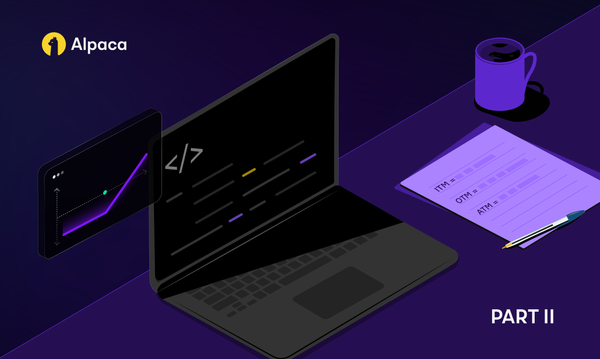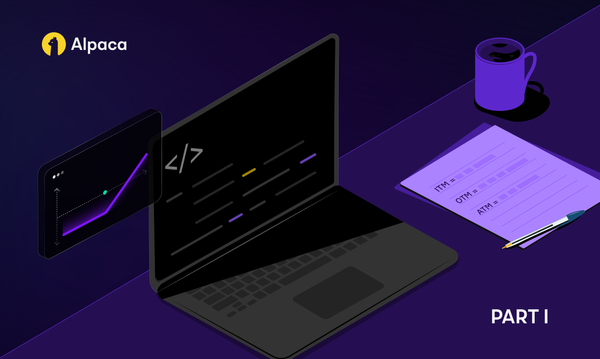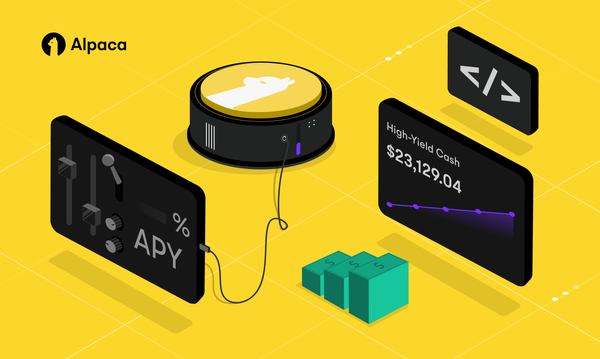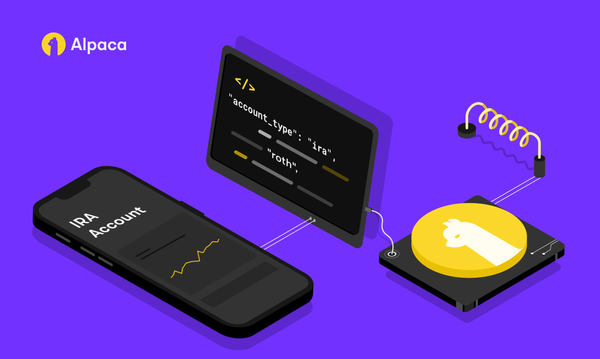Roger Cawdette of Finary #013
On our thirteenth episode of Fintech Underground by Alpaca, we interviewed Roger Cawdette, the Co-founder and CEO of Finary, a social investing platform building group chats for Gen Z and Millennials.
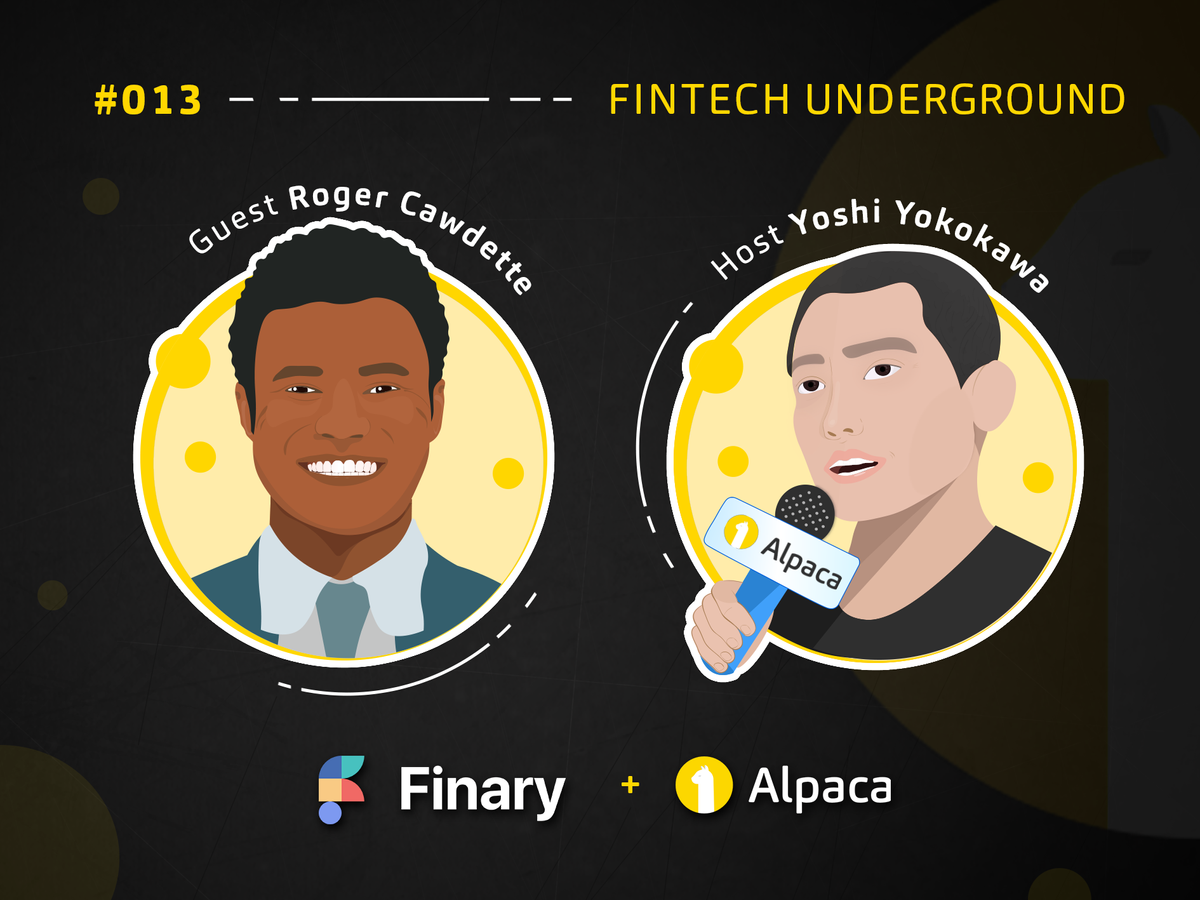
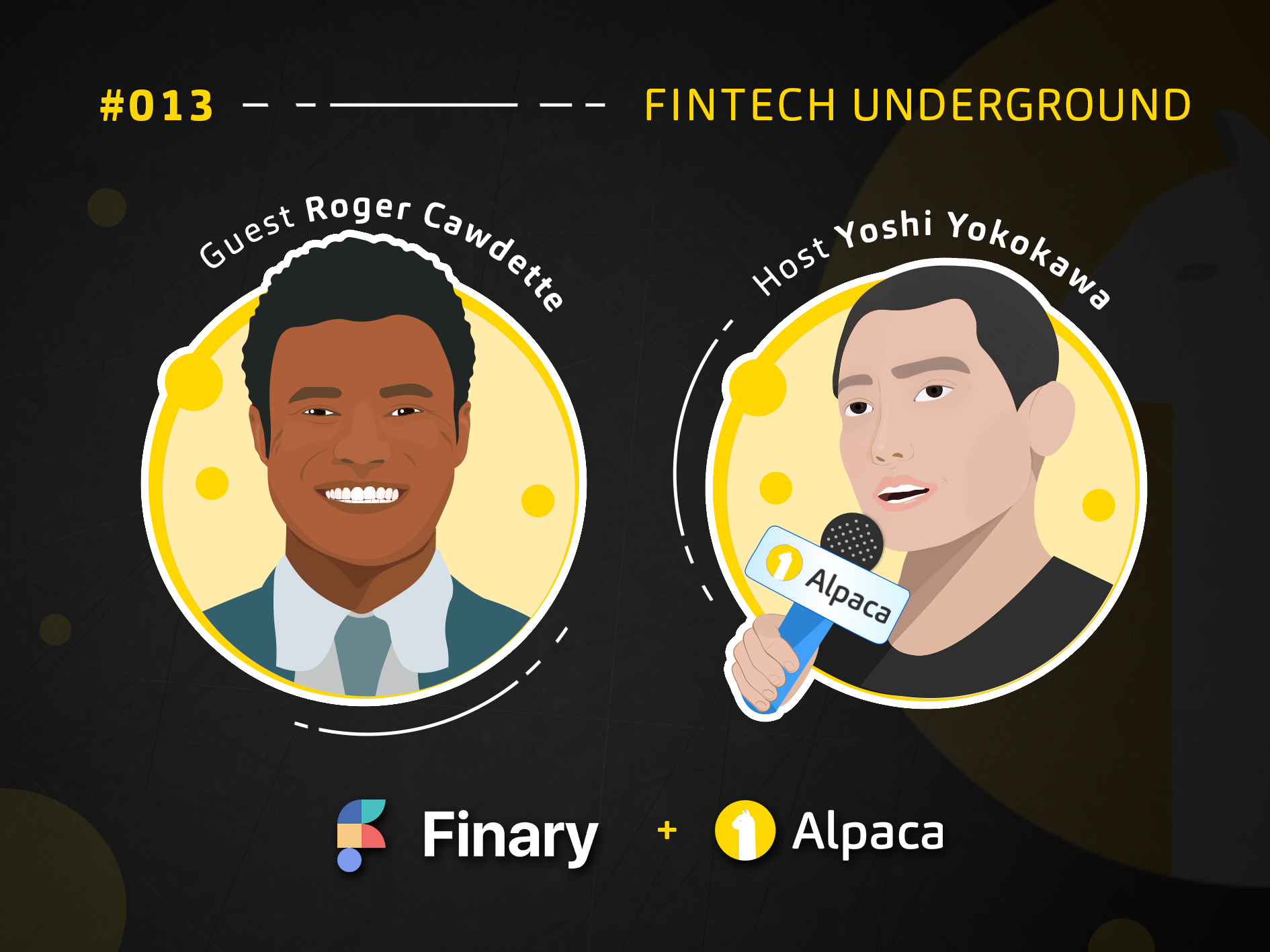
Any opinions expressed are opinions of the host and their guests. Alpaca Securities LLC does not recommend any specific investments or investment strategies.
Fintech Underground by Alpaca is a podcast devoted to all topics related to stock trading and APIs. From trading with algorithms or connecting apps or building out services, we aim to bring light to the different corners of Fintech.
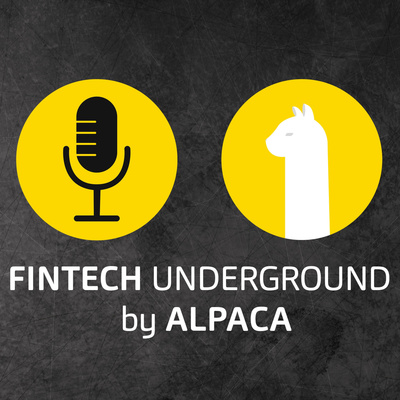
TL;DR
On our thirteenth episode of Fintech Underground by Alpaca, we interviewed Roger Cawdette. As the Co-founder and CEO of Finary, a social investing platform building group chats for Gen Z and Millennials, Roger discusses the acceleration of social investing, "meme" stocks and the WallStreetBets subreddit phenomenon, his path to founding the company, and more.
Summary
Finary offers an online community for excited investors to discuss stocks with friends, discover new communities, and make trades on the market, all in one place. Today we were lucky enough to speak to Roger Cawdette, the Co-founder and CEO of Finary, who shares his experience going through Y Combinator virtually, the company vision, and more.
Find the full transcript below. To hear more CEO/Founders of the most interesting Fintech companies speak about their experience in the industry check out our other episodes below.

Jason: [00:00:00] Welcome to Fintech Underground by Alpaca, a podcast devoted to stock trading API. From trading with algorithms to connecting apps to building out services Alpaca is built for developers and traders. And with that being said, let's get started.
Hello, everybody, welcome back to Fintech Underground by Alpaca. In each episode, we aim to explore a different area within Fintech.
In each episode, we aim to explore a different area within Fintech. We are incredibly lucky to speak to Roger today, the Co-founder and CEO of Finary, a social investing platform. Between chatting with friends about investments, to sharing your portfolio, to making trades, Finary aims to build a community platform for Gen Z and millennials. From the founding story and his experience at Y Combinator, Roger shares his insight on the startup space in FinTech, specifically on social investing. With Yoshi, CEO and Co-founder of Alpaca here to host, I cannot wait to hear what is going to be discussed today. So let's get started.
Yoshi: [00:00:56] Hey Roger, man. How are you?
Roger: [00:00:57] Good, good. Thanks for having me, Yoshi. I appreciate the opportunity.
Yoshi: [00:01:00] I really want to say thank you for taking your time to be on our podcast today, Fintech Underground. I know we have a lot to talk about, but I want to introduce you as the CEO, Co-founder of Finary. Do you want to do the typical YC elevator pitch?
Roger: [00:01:05] Thanks for having me. I'm Roger, I'm the Co-founder and CEO of Finary. What that is, think of it as Discord for investing. It's a place where you can talk about your investments with your friends and like-minded investors, but more interestingly, actually have access to your investing tool set. So that's live market data, market news, and the ability to actually make trades via your existing brokerage.
Yoshi: [00:01:33] And of course, after this elevator pitch, I'm sure a lot of people might ask you, why did you decide to start Finary?
Roger: [00:01:40] Exactly. Yeah, totally. As the story goes, a little over a year ago, all of my co-founders and I were actually college students. We were all in our respective campuses and we had noticed that a lot of our friends and a lot of people on campus were starting to invest in the, stock market for the first time.
But instead of using a lot of the more old fashioned resources that our parents used, like CNBC, Motley fool, Seeking Alpha, the likes of that, they're instead of using a lot more modern platforms -- things like Discord, Group B and even just plain old text messages, to talk about the stock market. So based on those observations, insights from our own personal experience of using those same platforms, and then also just doing a bit of user research, we quickly discovered that young people in particular were really in search of a way to have a more communal and social where on the stock market.
So we decided to set out to build that platform. The funny story here is that version one of Finary that we applied to YC with was actually built on top of Alpaca, which is why it's especially cool to be speaking with you today. So I appreciate the opportunity, man.
Yoshi: [00:02:35] I think like a lot of people will ask you this, but how was your experience going through YC? Was that helpful for you? What did you learn from going through YC?
Roger: [00:02:45] YC was super cool. It was 100% virtual, all completely over Zoom. But I think the benefit of that is that we got all of the learnings, not so much the social component, but it was super efficient. But I think YC is really cool in that you kind of realize as a result that going through startups is actually quite simple, in terms of the basic philosophy is that you follow things like make something that people want, raising money doesn't equal product market fit, very simple philosophies like that. So it was a great experience.
How was it for you? I think you were in person at the time. How was that?
Yoshi: [00:03:14] Yeah, I think we were in the W19 batch. What I felt was it was kind of really the boot camp where we learned the basics in a two week sprint. We get together with five or six like other companies in a micro group and have to say, I'm going to commit to this next two weeks and if we don't achieve it, "hey man, why didn't you achieve it? Why did you suck? It's kind of hard to answer, but yeah.
Roger: [00:03:43] Something just didn't work out. Yeah, it was super helpful to have that. That's social pressure from other founders in terms of being able to meet those two week, one week goals. I think most of the time we were able to meet them, but it was interesting observing a lot of other FinTech founders in particular, trying to hit those goals.
I think we learned a lot about the fintech space in terms of regulation, a lot of licenses and agreements that are just super difficult to navigate. So I think in particular with Finary, because we're more so of a communication social platform, as opposed to FinTech at this point, we get to size up a lot of those concerns, but definitely a lot of learnings there.
Yoshi: [00:04:14] Did you meet with any cool similar-minded founders who are in the similar space that you kind of still keep in touch with?
Roger: [00:04:21] For our batch there actually weren't too many companies in the social investing space. I think when they accepted that batch, it was right before the whole GameStop fiasco had happened. So social investing wasn't necessarily a big topic at the time, but there were a lot of cool companies that are cool things with FinTech, but it was just us for social investing.
Yoshi: [00:04:39] Nice. So talking about social investing, I've been personally following this space probably since back in, I don't know, 2012 or 2013 when eToro and Zulu trader and the Covestor were there.
How did you learn from those guys, even Stocktwits? Or even the public by the guys at Jannick, and there are a few others that are coming up. What did you think about as you were building the product YC and how are you thinking about that now?
Roger: [00:05:10] I think StockTwits and public did a great job of leading the field in terms of the social investing space, really establishing it, StockTwits, especially. But I think the core insight that we had when doing a lot of research and actually coming up with the initial concept for Finary was that those products aren't necessarily built for the specific use case that we were looking for amongst young retail investors. That being having daily conversations around the stock market with your friends and like-minded investors.
I think those products are more so designed for this more broadcasty Tweeting style, where you just send out your thoughts to the market, to various people and your followers, whereas for Finary, it's more so focused around having those spontaneous conversations -- "Tesla's down 10% on a given day, oh my god." You want to freak out with your friends, send a couple of memes and gifs, things like that. So I definitely appreciate a lot of the work that they've been doing and I'm super excited to actually see what happens down the line in terms of this whole world of social investing.
I think the core thesis here is that it's going to be humongous, incredibly large, and that there are going to be a number of players that fit those various different types of use cases, a number of which will probably be enabled by the Alpaca toolset, so I'm curious to see what happens there.
Yoshi: [00:06:17] Yeah, definitely. I appreciate that. And that's what we want to build the product for, and I think it's interesting to kind of really categorize, even within the social investing, different use cases.
How do you categorize, specifically, your unique case to be? Who's your niche and who are exactly target users? What kind of traction are you getting initially at this point?
Roger: [00:06:40] Yeah, so our user, you can think of them as the 20 - 30, so high end Gen Z, lower end millennial, people who have a little bit of experience in the stock market, probably aren't experts at this point. Certainly not beginners. They just want to have daily conversations with their friends and like-minded investors. Very much as a social activity. So some of the insights that we've actually had from our platform so far is that people aren't necessarily having these daily conversations because they want to find new stock ideas or have actionable insights in a lot of cases.
And a lot of times they're actually just doing it to have fun, in the same way that gaming brought a lot of people together in the 2010's . And even now, I think that investing is one of those other social forefronts in terms of bringing people together in terms of the various use cases. So we very much focus on those conversations, but I think down the line and a number of companies are going to focus on what I was mentioning before; broadcasting your ideas to the market, maybe sharing memos, like in the case of common stock, perhaps following super experienced portfolio managers, things like that.
But we're really excited about just focusing on conversations and spontaneous communication amongst young retail investors for now.
Yoshi: [00:07:44] Yeah. You just raised seed round of $3.2 million led by Upfront. So firstly, congratulations to that! That's a big amount of money. How was your experience going through this seed investing, fundraising activity - completely online, right? What was it like?
Roger: [00:08:10] I think you'll talk to most founders and find that they hate fundraising. It's just like the most brutal process ever. I think, especially within the context of COVID and Zoom, it was especially tough in that because there's more of a streamlined process you can just take 10, 12 calls per day, which is incredibly taxing. So it was a pretty intensive process. I remember talking about it with our YC batch or YC micro subgroup, and everyone being like, yeah, fundraising is not the most fun. Like this is terrible. I just want to get it over with. Luckily enough, we were able to go ahead and fundraise at the very beginning of the batch and have a bit more energy back then.
But we got it done over the course of a month and ended up with Aditi Maliwal of Upfront Ventures, who we're super excited to be working with. She's amazing with the Series A and Chime back in the day. So she's awesome, has been great. Also working with the team at Dash Fund so it's been an awesome time.
Yoshi: [00:09:02] How long did it take for you to get the term sheet? What was your emotional roller coaster like?
Roger: [00:09:09] I think it was about a month between starting that process and getting that term sheet and then a couple more weeks in terms of actually getting the deal done. But I think in terms of an emotional roller coaster, you get really shocked when you get just dozens of rejections in a row.
It kind of just does something to your confidence, but it eventually built a certain durability that you have, where as you get more and more reductions, you're just used to it. So it was like almost the default result and outcome so that when you actually get yeses, it's like, oh, this is a nice surprise.
That being said was definitely a very, very brutal process, but I'd be super curious to hear more about how it was fundraising in person. Did you just drive out to literally every VC office out there?
Yoshi: [00:09:49] Yeah, I mean, it only took you like a month, right? That's amazing. For us it was an extremely long and painful process.
It's partly because we had the previous business that we pivoted from and existing, investors on the cap table. And that of course made it kind of difficult for us to really be too flexible in terms of like how we can structure it. We ended up finding a great investor that we love, Santo from Spark, but yeah, we got numbers of numbers, of numbers of rejections, and a lot of people really don't appreciate this experience, looking from the outside. So I appreciate you bringing that up, you know, getting rejections.
Roger: [00:10:35] Totally. It's just a part of the journey. Like you were saying, people don't necessarily realize when they look at Tech Crunch headlines, that it's just this really intensive process; but all in all, I feel like we just grew a ton as a team, especially as young co-founders. So it was a good experience, all in all.
Yoshi: [00:10:51] This is your first company?
Roger: [00:10:52] Yeah, this is my first company. For context, I'm 21 years old. My co-founders are also 21, 22. We're fairly young. So this is certainly our first company, but I think one of the coolest things, or probably the coolest things of building your own company and startup, is that you get to just have an immense amount of learnings on a day by day basis. But yeah, first time, we're just learning a ton at this point.
Yoshi: [00:11:12] So you dropped out from school to do this?
Roger: [00:11:15] Yeah, one could say I dropped out. My school in particular is pretty flexible about going back. So I'd like to go back someday, far down the line, but for now, yes, I'm a dropout working on a startup.
Yoshi: [00:11:26] So as the first company that you're building, what is this grand vision, because I think I had difficulty balancing out even fundraising processes, what's going on right now. What is the growth curve of the hockey stick that they want to see while talking about where this can be in a longer term, if we skew to an either-or extreme?
People are like, why are you talking about too many details? And like, if it's too much of that long term [view], then why are you talking about dreams and what is the actual hockey stick? So for you, what is this whole grand vision that you're trying to achieve in five years, 10 years of the time?
Roger: [00:12:08] So our grand vision, or rather our mission, is to become the world's best investing community. And what that means in practice is that people will no longer use Discord or text message or wall street bets to have their conversations around the stock market. They're going to come to Finary as a centralized community to discover new insights, new stock ideas, have conversations with people with similar interests, and even make your trades VR platform.
So that's really the grand vision. I think we're well on our way to that. And I'm just super encouraged by the fact that the social investing space has just really taken off in the last year. Super funny in that when we were first starting out with Finary, this was, you know, 2020, maybe 2019, social investing was just not really a thing.
I'm really happy that our thesis really played out, most likely on a very accelerated timeline because of the pandemic, but just super excited to be in the space. I think in the last couple of months, it's kind of died down in terms of the amount of activity around meme stocks and the like. But I think that social investing has just so much more room to run in the future, and at Finary, we're truly excited about being able to build the infrastructure tools to support that whole social revolution.
Yoshi: [00:13:10] Yeah. And I think the community aspect is so important, right? As we are building Alpaca as well, the community of developers is something that we really double down on. So I really appreciate the emphasis on community and how you're betting on that.
At the same time, for the meme stocks, it is true. The volatility went down, like VIX is a little bit lower than the average, but I think what we are seeing is that those meme stocks and the Reddit revolution is just the beginning, in my opinion. Considering it's only English right now, what happens if it goes to different languages and there's a world population? That's so much bigger than just the U.S. population. And I'm kind of thinking about it all the time. These meme stocks will be happening every single day when there's a hundred, almost 200 countries doing the same thing, you know?
Roger: [00:14:02] Yeah. That's actually such a cool point, I did not realize that at all. What if meme stocks just translated to every country in the world? Wow, that's crazy to think about. I was actually just thinking about in terms of, you know, the US stock market.
Of course we want to be a global company someday, but did not realize that that change could go across the world. Thank you for that. That's actually really interesting.
Yoshi: [00:14:19] Yeah. And for the US stocks as well, I'm from Japan, and most of the companies go IPO in the US anyway.
So what the people want to have exposure to is mostly US stocks and people talk about, of course, Coinbase and Airbnb, everywhere in the world. So I think that's how the community can be anywhere in the globe, and if the accessibility to those things can be global, like these meme stocks can be a world phenomenon that's happening every day.
Roger: [00:14:52] And that's part of the vision as well, in terms of making the case that a random kid from Chicago can have conversations around the stock market with a guy from, I dunno, Budapest, or Tokyo even. I think that's the ultimate vision, the ultimate dream. Of course, right now we're very much starting with a smaller niche of gen Z millennial retail investors is typically in the US but definitely down the line we have much, much larger aspirations.
Yoshi: [00:15:16] Yeah. And speaking about location, we were just chatting about how your team's not going back to the office in New York and you're currently in Boston right now. What is your experience like working remotely and were you working as a team remotely, even during YC or you were in one place going through YC?
Roger: [00:15:40] We were all in one place and in a nice small, WeWork office here in Boston during the batch, which probably wasn't the safest thing, but we definitely wanted to take that tradeoff of higher productivity for some of the additional risk, but it was a great experience.
It was super productive, YC was great. We actually just moved to a new office in HQ in New York City as of a month ago. It's been great there as well. I think with our friends, young people in particular, being able to work in New York City is a really awesome experience, so it's been a lot of fun so far.
Yoshi: [00:16:10] Is it very different from living in Boston?
Roger: [00:16:13] Definitely. Way more young people, especially because right now it's internship season, a lot of college students in the city. A lot of opportunity to actually tell people about a product, very organic distribution that way.
We were also talking about how Alpaca is now completely remote. I'd be curious to hear more about that decision and that thought process.
Yoshi: [00:16:31] Yeah, yeah. We had a physical office before this pandemic, early last year, in San Mateo, California. But obviously this whole COVID thing forced us away from working at the office.
So we just kind of made a conscious decision of, why not go extreme and go completely remote? And when we really went remote, why not go completely global? So that's kind of what we decided to do. Since then we grew a lot; there are a lot of challenges, but at the same time there are advantages.
We're still trying to balance out how we can mitigate the cons, which is, communication is difficult, you know, we cannot grab together after work type of thing. So that's really what I miss the most.
Roger: [00:17:22] Totally understand that.
Yoshi: [00:17:23] I think what has been an advantage for us is being a globally distributed team, so we have 12 or 15 nationalities and different places that people are working from. It allows us to be empathetic about how the situation is in each of the countries where each of the culture jurisdiction is in terms of the relationship with money and investing.
So I think that has been working well for us, to understand better about the potential partners and the developers that we work with.
Roger: [00:17:55] Totally. And if I understand correctly, I believe Alpaca is being used by companies all across the globe. I think GoTrade is built on top of your tech, so they're a global Robinhood, so that's really awesome.
Yoshi: [00:18:04] Yeah, our thesis is different. We want to be the infrastructure for makers and entrepreneurs. So we want even the high school kid who wants to just build something over the summer, we want to be able to support that with our product.
And it gives us the requirement to be flexible in terms of the product. So that allows us to understand what features that we need to build, that can be useful. Of course, big companies but our focus is really how we can be available for everyone that you know, who wants to just build something even small.
Roger: [00:18:38] Totally. And that was exactly us. We were those young college students who were using our Alpaca to build V1 of Finary. It got us into YC so we're incredibly grateful to you and the company.
Yoshi: [00:18:47] Thank you for that. And I hope that's going to continue. Going back to a little bit about yourself and your background, you and your friends started the company with your own problem.
Have you always imagined yourself to start a company as you were going through the initial years of college and high school? When you look back, how were you thinking about it? And how did it turn out to be what you are doing right now?
Roger: [00:19:18] Funny enough, all the co-founders and I definitely had that entrepreneurial itch going into college. Some of my co-founders had worked on previous side projects and small ventures in the past. So when we came across this concept for social investing in just this very obvious future where people around the world would just talk about the stock market on a daily basis in the same way that they talk about sports or politics or whatever it might be.
We just really jumped at that opportunity. We're very quick to effectively drop out of school and go work on this full-time. And because one, we really wanted to be founders and build our own company, but two it's just really cool, and I think rare to come across an idea that you feel so passionate about. On that same note I think the coolest milestone that we hit pretty recently was that my co-founders and I are personally very, very addicted to using Finary on a daily basis. So it fits into that mantra of make something that people want, but also for YC, make something that you and your friends would use. We've hit that so far.
So it's been very good, we were always looking to start a company. It's just super fortunate that we were able to find this particular niche and space.
Yoshi: [00:20:19] Now you're hitting the point where you yourself are now humongous fans over your products. What should users expect now to see from your products and what is the next that thing you're excited about that you want to let your users know?
Roger: [00:20:36] Right now, we're actually in a closed beta. We have a web platform out there in the world, but we're actually shipping our mobile app to the app store in about two or three weeks. So we're really excited about that. It's at that point that we can effectively open up the flood gates to our platform, open it up to the world, at which point we'll have even more conversation, even more people, super excited to just talk about the stock market on a daily basis, having those spontaneous conversations.
We're really just excited to see more people come join the community. More connections that are made, more friendships that are built and bonded, but that's probably what 90% of my brain powers focus on at this point. Just thinking about this upcoming launch. As you can imagine with any given startup and company, there's just so many things to think about, but I'm particularly excited about that.
Yoshi: [00:21:17] Wow, so it's really coming up. Two three weeks is almost here. I'm sure like you were like in rumbling around testing, you know, making sure it's working and getting ready for the press release and stuff like that, right?
Roger: [00:21:29] Right, squashing bugs, putting out fires, having to deal with random asides, but it's a really cool experience. Like I was saying before, being able to go through all this and just continually learn on a daily basis and just push yourself is one of the most rewarding things. I think that's why my co-founders and I were all super excited to go work on a startup, especially the one that we cared about, but it's been a great experience.
For you, like, how are things going? Is it super crazy, a lot of fires to put out, how are you feeling?
Yoshi: [00:21:56] I think what we have realized, and have been realizing, is that something is always happening. And there are a bunch of other things that we're not in control of, including meme stocks and market volatility.
And there are a lot of compliance things, regulation, things that we continuously do work with. And while doing that, we have to keep building the features. So it's extremely busy. We continue to hire the best people in the world, but it's a very, very overwhelming experience to be in this space right now.
Roger: [00:22:33] Yeah. I guess it sounds like a meme stocks is certainly causing a lot of excitement and stress for the both of us. But I think the really cool thing about the whole wall street bets episode and meme stocks in concept is that it really just made the stock market seem like a less scary place.
And that's really one of the goals that we have here at Finary, making it so that any given person across the country, across the world, feels like the stock market is for them. Like it's not this crazy place for super rich people with suits. So while, again, meme stocks have caused a lot of craziness around the market, it's definitely made it a far more accessible place for a lot of people, which is great.
Yoshi: [00:23:12] I completely agree. Our company vision is to offer the access to that stock market and in financial services to 7.8 billion people on the planet. So that has to be accessible, right?
And I think you're completely right. The whole thing became more casual. And I think that was the key that was probably missing in probably like last five, 10 years.
Roger: [00:23:40] Right, it's like meme stocks are the hook. They get people into the stock market. And then the big questions that we focus on at Finary is, how do you keep people inside? Keeping them coming back. So we're just really excited to be working about working on these problems, thinking about them. It's just been a great time so far.
Yoshi: [00:23:55] What is it, come for the product and tool and stay for the community?
Roger: [00:24:00] Yeah. To go into the details, it's actually flipped. So you come for the community and you stay for the tools and the community as well, but definitely a great way of phrasing it. For sure.
Yoshi: [00:24:09] I think I need to study a little bit more to make sure that I'm talking about the right phrase. Thank you very much for correcting me, I appreciate that.
So we're about to wrap it up, but I always ask this question to founders. As we are going through FinTech and its regulations, I'm sure it's because of social investing, or investment advice kind of stuff, or marketing and solicitation...and of course, you have to deal with the actual market volatility that you cannot really have control over, to keep users happy. It's always like, why do we have to do this thing? Like this wasn't FinTech. I would not be spending my time thinking about this or dealing with like a lot of things. It's always kind of an overwhelming experience, which I learn a lot from, but I wanted to ask you: considering all those things, is being in Fintech worth it for you?
Roger: [00:25:19] Yeah, I think it certainly is. While dealing with those questions and issues isn't the funnest thing in the world, it definitely is outweighed by some of the feelings of gratitude and gratefulness that you get from being able to make the stock market a more appealing place for young people in particular, building this community where people can actually have cool conversations and have a good time.
Like I was saying before, our mission is to build the world's best investment community and that just feels so much better than these small things that we have to deal with. But I'm super curious to see how a lot of this pans out. I think one of the benefits of being a social investing platform is that we aren't necessarily an investment advisor.
So we make very clear to our users that we're not giving investment advice. The conversations that happen on Finary are purely for informational and educational and entertainment purposes, right? They're just conversations. And I think one of the other benefits is that a lot of these conversations are currently happening on Reddit, they're happening on Discord.
Being able to actually have tool sets and features that actually encourage more responsible investing, things like being able to see people's portfolios in real time so you actually can actually have some transparency into the type of investor they are, being able to have live stock market data, market news, analyst ratings.
We think we're making that community far more responsible, but definitely a lot to think about going forward for sure.
Yoshi: [00:26:35] Thank you very much for the tips and learnings and sharing with your experience. Thank you very much, Roger, Co-founder and CEO of Finary, super excited for the mobile launch to come. Thank you very much for your time, man.
Roger: [00:26:46] Thanks for having me! I appreciate the opportunity. It's awesome.
Jason: [00:26:50] I also wanted to thank all of our listeners for joining us today. On this episode of FinTech Underground by Alpaca. As always check out all of our past episodes on all major streaming platforms podcasts can be found. Thank you.
If you liked this episode of Fintech Underground by Alpaca, make sure to check out our other episodes below.

You can also follow Alpaca and our weekly updates on our LinkedIn and Twitter!
Brokerage services are provided by Alpaca Securities LLC ("Alpaca"), member FINRA/SIPC, a wholly-owned subsidiary of AlpacaDB, Inc. Technology and services are offered by AlpacaDB, Inc.


